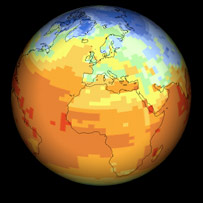In 1991, I was working with students who produced an international online student magazine called "Icarus".
It looked at the emerging science behind what was then a new topic, the Ozone Layer and Global Warming. These were High School students who managed to interview and document the work of scientists in the CSIRO and United Nations Climate research centres.
It was apparent then, listening to half of the world's Nobel Prize Winning scientists and the Union of Concerned Scientists, that real strategic action needed to be taken. This action, by governments and people alike, has yet to occur.
Perhaps the word of the President of one of the largest Oil companies in the world may lend more weight to convincing those that the overwhelming majority of the world's scientific community appear unable to do.
John Hofmeister, President of Shell Oil, USA, speaks about Shell's position
on energy conservation and Global Warming.
The speech was made at the Washington University, St. Louis, USA in September
2006.
If you are having trouble with the enhanced file, try this MP3 version here.
Edit: 4th of October
If this is not enough, please listen to this
excerpt from the ABC's "The Science Show".
Gary Meyers, Senior Principle Research Scientist from CSIRO Marine
Research Hobart Tasmania and Chris Thomas, Professor of conservation biology
University of York UK are interviewed by Robyn Williams.
The full version can be found on the science
show website.
Edit 5th of October
One more... The BBC reports : World
'warmest for 12,000 years'
 The
world is the warmest it has been in the last 12,000 years as a result of rapid
warming over the past 30 years, a study has suggested. The
world is the warmest it has been in the last 12,000 years as a result of rapid
warming over the past 30 years, a study has suggested.
Nasa climatologists said the Earth had warmed by about 0.2C (0.4F) in each of
the last three decades.
Pollution from human activity was pushing the world towards dangerous levels
of climate change, they warned.
As a result, plant and animal species were struggling to migrate fast enough
to cooler regions, they said.
"The evidence implies that we are getting close to dangerous levels of
human-made pollution," warned James Hansen, head of Nasa's Goddard Institute
for Space Studies, New York.
[Source: BBC]
9:56:39 AM 
|
